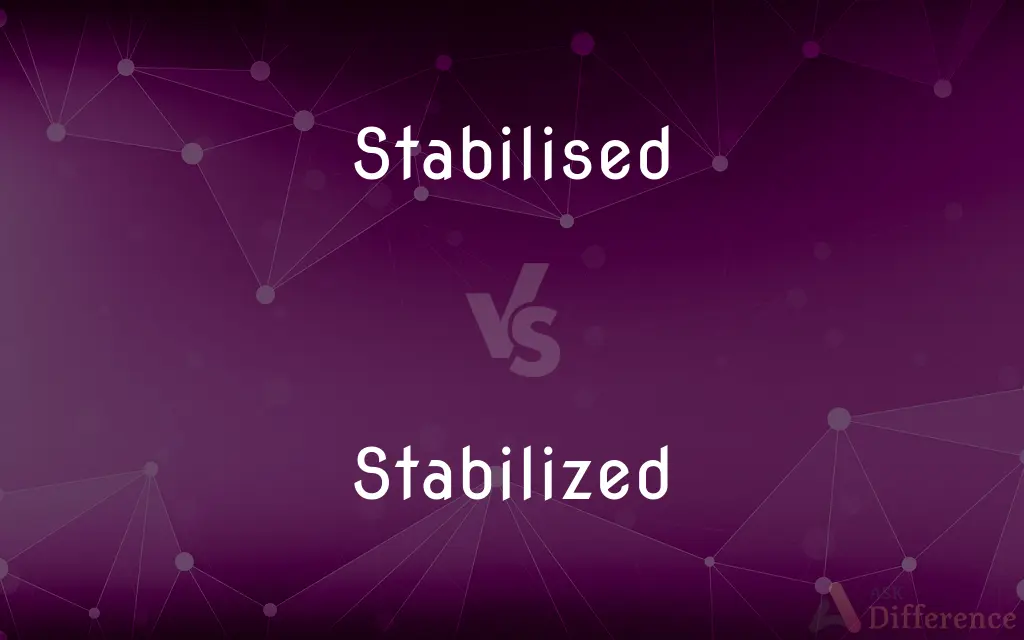Stabilised vs. Stabilized — What's the Difference?
By Urooj Arif & Fiza Rafique — Updated on March 21, 2024
"Stabilised" reflects British English spelling focusing on equilibrium, while "Stabilized" is the American English variant, both meaning to make steady.

Difference Between Stabilised and Stabilized
Table of Contents
ADVERTISEMENT
Key Differences
"Stabilised" is the form used in British English, indicating the process of making something stable or less likely to change. Whereas "Stabilized" follows the spelling conventions of American English, carrying the same meaning but differing in orthography as a reflection of the linguistic preferences in the United States.
In various contexts, such as engineering or medicine, "stabilised" often appears in literature and reports originating from countries like the UK, Australia, and New Zealand, emphasizing local spelling norms. On the other hand, "stabilized" is predominantly used in documents and publications from the United States, showcasing the spelling preferences that distinguish American English from its British counterpart.
The choice between "stabilised" and "stabilized" can also indicate the intended audience or the origin of the text, with "stabilised" signaling a connection to British English-speaking regions, whereas "stabilized" may make the content more accessible to American readers.
While both spellings are correct within their respective linguistic frameworks, the use of "stabilised" in an American context or "stabilized" in a British context could be seen as an error, highlighting the importance of consistency with the audience's spelling conventions.
The variation between "stabilised" and "stabilized" exemplifies the broader differences between British and American English, which include not only spelling but also pronunciation, vocabulary, and sometimes grammar, though the meaning remains the same in both dialects.
ADVERTISEMENT
Comparison Chart
Spelling Variation
-ised ending (British English)
-ized ending (American English)
Usage
Preferred in UK, Australia, NZ
Preferred in the United States
Linguistic Influence
Reflects British English conventions
Reflects American English conventions
Context
Used in contexts favoring British English
Used in contexts favoring American English
Orthography
Part of a wider pattern of -ise vs. -ize
Consistent with American spelling rules
Compare with Definitions
Stabilised
Maintained at a constant level.
The patient's condition was stabilised overnight.
Stabilized
Made less likely to change or fail.
The government took steps to stabilize the financial market.
Stabilised
Made less likely to change or fail.
Measures were taken to stabilise the economy.
Stabilized
Made steady or secure in position.
The team stabilized the bridge after the earthquake.
Stabilised
Kept from fluctuating.
The currency was stabilised to prevent inflation.
Stabilized
Maintained at a constant level.
His vital signs have stabilized, according to the doctor.
Stabilised
Made resistant to chemical or physical change.
The compound was stabilised for long-term storage.
Stabilized
Kept from fluctuating.
Prices were stabilized to avoid a market crash.
Stabilised
Made steady or secure in position.
The engineers stabilised the structure with additional supports.
Stabilized
Made resistant to chemical or physical change.
The vaccine was stabilized with a new formula.
Stabilised
Simple past tense and past participle of stabilise
Stabilized
To make stable or steadfast.
Stabilised
Made stable or firm
Stabilized
To maintain the stability of (an airplane or ship, for example) by means of a stabilizer.
Stabilized
To keep from fluctuating; fix the level of
Stabilize prices.
Stabilized
To become stable, steadfast, or fixed.
Stabilized
Simple past tense and past participle of stabilize
Stabilized
Made stable or firm
Common Curiosities
What does "stabilised" mean?
"Stabilised" means making something steady, secure, or less likely to change, using British English spelling.
What does "stabilized" mean?
"Stabilized" refers to the act of making something steady, secure, or less likely to fluctuate, in American English spelling.
Why are there two different spellings for "stabilized"?
The different spellings reflect the orthographic conventions of British and American English.
Can "stabilised" be used in American English?
While understood, "stabilised" is not the preferred spelling in American English contexts.
Where is "stabilized" most commonly used?
"Stabilized" is predominantly used in the United States, in similar contexts as "stabilised."
Does the choice between "stabilised" and "stabilized" affect comprehension?
No, the choice does not affect the comprehension of the meaning, only the regional spelling preference.
Are "stabilised" and "stabilized" interchangeable?
Yes, they are interchangeable in meaning but used in different English-speaking regions.
What is the most common context for using "stabilised"?
It is commonly used in scientific, medical, and engineering contexts within British English-speaking countries.
Are there other words with similar British and American spelling differences?
Yes, many words have similar spelling variations, such as "organised" vs. "organized."
Can software correct "stabilised" to "stabilized" and vice versa?
Yes, spelling and grammar checkers can suggest corrections based on the language setting.
Is "stabilized" correct in British English?
"Stabilized" is recognized in British English but "stabilised" is the standard spelling.
Does using "stabilised" over "stabilized" change the pronunciation?
No, the pronunciation generally remains the same despite the spelling difference.
Is one spelling more correct than the other?
Neither spelling is more correct; the preference depends on the regional variant of English being used.
How does "stabilised" relate to "stabilized" in professional writing?
Professional writing chooses the spelling based on the intended audience's regional English norm.
How can I remember which spelling to use?
Remembering the audience or the region you are writing for can help choose the appropriate spelling.
Share Your Discovery

Previous Comparison
Plum vs. Quetsch
Next Comparison
Property vs. LegitimAuthor Spotlight
Written by
Urooj ArifUrooj is a skilled content writer at Ask Difference, known for her exceptional ability to simplify complex topics into engaging and informative content. With a passion for research and a flair for clear, concise writing, she consistently delivers articles that resonate with our diverse audience.
Co-written by
Fiza RafiqueFiza Rafique is a skilled content writer at AskDifference.com, where she meticulously refines and enhances written pieces. Drawing from her vast editorial expertise, Fiza ensures clarity, accuracy, and precision in every article. Passionate about language, she continually seeks to elevate the quality of content for readers worldwide.















































